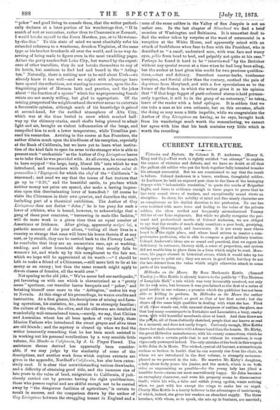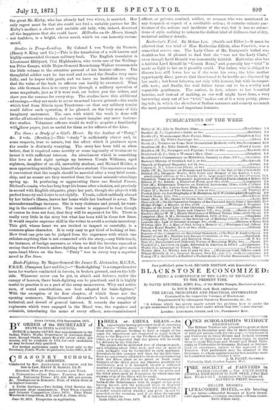Hilksden on the Moors. By Rosa Mackenzie Kettle. (Samuel" Tinsley.)—Miss
Kettle is already known to the public by "The Mistress. of Langdale Hall," a tale which was very favourably received, not only for its owia sake, but because it was proclaimed as the first of a series of good novbls in one volume ; a promise which the publisher has notbeen able or killing to perform. In Hillesden on the Moors the author has not,found a subject as good as that of her first novel ; but she sho.ws all the same high qualities in dealing with what she has. First of all, tlere stands out, with unusual sharpness of outline, the place, clue; that ha many counterparts in Yorkshire and Lancashire, a busy, smoky town, aith wild beautiful moorlands close at hand. And then there are the peple, all of them distinctly sketched, people that one knows an real. in a moment, and does not easily forget. Curiously enough, Mies Kettle- draws her male characters with a firmer hand than the female. Mr. Kirby,. the great Hillesden manufacturer, with his county connections, whieb,he regards with a certain pride that is not without its vexatious, is very vigorously portrayed indeed. The only mistake of the book in this respect. is Sir John de la Hoste. The wicked, cynical old baronet, a misanthropio recluse so broken in health that he can scarcely rise from his chair, to whom we are introduced in the first volume, is strangely metamor- phosed as we proceed in the tale. He marries Mr. Kirby's daughter* a lady about forty years his junior, and the match, which is on WIN sides as unpromising as possible—for the young lady has jilted' et humbler lover—turns out most marvellously happy. Sir John becomes an exemplary character, and even his property seems to disencumber itself; while his wife, a false and selfish young egotists wants nothing when we part with her except the wings to make her an angeL Clearly Miss Kettle is a hearty believer in the advantages of matrimony, of which, indeed, she gives her readers an abundant supply. The three- heroines, with whom, so to speak, she sets up in business, are married;
the great Mr. Kirby, who has already had two wives, is married. Her only regret must be that she could not find a suitable partner for Mr. ltirby's mother, a clever and amiable old lady, wife, indeed, deserved all the happiness that she could have. Hilleselen on. the Moors, though not faultless, is a bright, clever novel, which we can honestly recom-



































 Previous page
Previous page